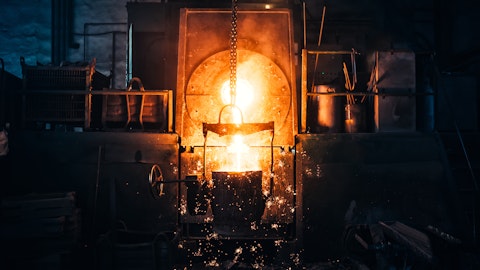Todd Becker: Yes, it was interesting. When the market was in the 40s and 50s we were selling – we were still selling our oil at kind of $0.05 to $0.12 over that market. So that was just the market for corn oil distillers – renewable corn – as we call it, renewable corn oil. Now that the soybean market has rallied on the front end a little bit, those sales obviously from the standpoint of doing basis sales are beneficial to us. But beyond that, we are still selling at a premium to that. I mean, I think there’s just multiple factors. I think there’s not – I don’t know that the supply is the issue. I think demand is just becoming so robust that we’re starting to see really good uptakes of oils into renewable diesel.
More importantly though, when you kind of look at some recovery in LCFS, when you look at the value of CI points for what we produce, and even tallows, when you look at the low CI feed stocks we have not really seen anywhere where those will trade anywhere that discounts the soybean oil anymore. And in fact, as we move towards 2025, which is just not that far away, we have a benefit to the end users because of the IRA to use more corn oil. So we’re really in a really good position. What we didn’t mention Manav as well is that Fluid Quip continues to see in their technology expanded yields before we even get to SFCT technology. So, we are implementing one of their technologies, new technologies in Wood River over the next several months, which we believe has the capability to increase our yields at an MSC facility to kind of 1.3, 1.4. And they’ve already seen those results at an earlier application at a non-Green Plains plant that they had a different system running already.
They upgraded it. So now we’re going to take those findings and apply it. So we’re very confident in our ability to produce oil, but I think it’s really just demand is finally showing up. And I think supply has not really grown, quite frankly. I mean, we’re not making any more oil as an industry. We’re not making it soybean oil. There’s not a bunch of new plants that started up in soy crushing that’s coming, but so the supply hasn’t really expanded while demand is finally kind of exceeding it again.
Manav Gupta: Okay. And a quick follow up here is the Wood River outage kind of hit you multiple ways. It hit your ethanol production, corn oil, also your ultra-high pro. Help us a little understand a little bit better during the OSHA investigation or otherwise. What are some of the lessons learned here and what can be done to make sure something like this does not happen again? Thank you.
Todd Becker: Well, we don’t want ever want it to happen. I think it was an unfortunate event. It was during the shutdown, we can’t really get into a lot of the details. OSHA has released the plant back to us, and we were already preparing during the end of that to bring that plant up as fast as we could. Took a little while to get protein and oil running, we just want to make sure the team was good and stable. But look, these are incidents that we never want to happen. So, I mean, we learned from every incident like this. It’s unfortunate. It is hard on the team. It’s hard on the company overall. It’s not just the Wood River facility. We are certainly cognizant of what it can do to our employees, and I think it just had multiple effects across the company.
But there is as we move on, we’ll just take our learnings. But I think overall we are running that plant full out again and the team is in good shape and OSHA has released the plant back to us. So we just – we’ll move on and learn from that.
Operator: Next question comes from Salvator Tiano, Bank of America. Salvator, please go ahead.
Salvator Tiano: Yes, thank you very much. I actually want to get a little bit more color on the rest of the outages. So firstly, if I understood correctly, given the $0.15 to $0.20 impact that you said on consolidated margins, it seems to us that it’s probably another $10 million to $20 million impact that you saw in other facilities besides Wood River. And does this make sense? And also, what type of outages were they, did you uncover essentially things during plant turnaround that needed to be repaired or what they or simply things broke down throughout the quarter?
Todd Becker: Yes, I think it was a little bit of everything you’re talking about. And on top of that, you have the domino effect of having good hedges on in an expanding market, having good sales on of high protein in a decreasing market, which then you lose those and you have exit some of those opportunities. And so it was, yes, it was a combination of the fact that we were in shutdowns that took a significantly longer to bring back up as we found more areas that we needed to repair. And then overall, we had some significant unplanned downtimes of things that just happened during the quarter. It was a bit of a perfect storm. We weren’t expecting it. But what we were able to do then is during those, our operations team again we brought in a new head of operations.



